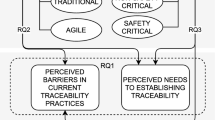Abstract
“Which traceability tool?” is a question that many organisations can spend time and resources considering. It has long been a perception that a tool, once acquired and installed on a project, can address all of its traceability-related needs. However, the purchase or development of a tool to support traceability can be a costly decision. Not only can the tool become shelf-ware, organisations can get burdened with expensive support contracts, disproportionate effort can get misdirected towards learning to use the tool and configuring it to address particular needs, and inappropriate use can lead to erroneous decisions. Acquiring a tool to support traceability is no trivial matter and it needs to be undertaken as part of a broader process improvement initiative. This chapter presents a seven-step guide for the practitioner to make decisions about tools to support their particular traceability needs from within the wider context of a new or improved requirements management system.
The material in this chapter was the basis for a mini-tutorial presented by the authors at RE’09 (Gotel and Mäder, 2009).
Access this chapter
Tax calculation will be finalised at checkout
Purchases are for personal use only
Similar content being viewed by others
References
Alexander, I.: Requirements tools listing and synopsis. http://easyweb.easynet.co.uk/~iany/other/vendors.htm. Accessed Dec 2010
Alexander, I., Beus-Dukic, L.: Discovering Requirements: How to Specify Products and Services. Wiley, Chichester, England (2009)
Atlantic Systems Guild Ltd.: Volere requirements resources: Requirements tools. http://www.volere.co.uk/tools.htm. Accessed Dec 2010
Atlassian Pty Ltd.: JIRA. http://www.atlassian.com/software/jira/. Accessed Dec 2010
Berenbach, B., Paulish, D.J., Kazmeier, J., Rudorfer, A.: Software and Systems Requirements Engineering: In Practice, p. 200. Mc-Graw-Hill, New York, NY (2009)
Borland Software Corporation.: CaliberRM™: Enterprise software requirements management system. http://www.borland.com/us/products/caliber/. Accessed Dec 2010
Davis, A.M.: Just Enough Requirements Management: Where Software Developing Meets Marketing, p. 6. Dorset House Publishing, New York, NY (2005)
Ebert, C.: Systematisches Requirements Management. Dpunkt verlag, Heidelberg (2005)
Gotel, O., Finkelstein, A.: An analysis of the requirements traceability problem. In: Proceedings of the 1st International Conference on Requirements Engineering (ICRE’94), pp. 94–101. IEEE Computer Society, Colorado Springs, CO (1994, April)
Gotel, O., Mäder, P.: How to select a requirements management tool: Initial steps. In: Proceedings of the 17th IEEE International Requirements Engineering Conference (RE’09), pp. 365–367. IEEE Computer Society, Atlanta, GA (2009, August–September)
Hammer, T., Huffman, L.: Automated requirements management – beware HOW you use tools: An experience report. In: Proceedings of the 3rd International Conference on Requirements Engineering (ICRE’98), pp. 34–40. IEEE Computer Society, Los Alamitos, CA (1998)
Heindl, M., Reinisch, F., Biffl, S., Egyed, A.: Value-based selection of requirements engineering tool support. In: EUROMICRO-SEAA, pp. 266–273 (2006)
Higgins, S.A., de Laat, M., Gieles, P.M.C., Geurts, E.M.: Managing product requirements for medical IT products. In: Proceedings of the 10th IEEE International Requirements Engineering Conference (RE’02), pp. 341–349, IEEE Computer Society, Los Alamitos, CA (2002)
Hoffmann, M., Kuhn, N., Weber, M., Bittner, M.: Requirements for requirements management tools. In: Proceedings of the 12th IEEE International Requirements Engineering Conference (RE’04), pp. 301–308. IEEE Computer Society, Washington, DC (2004)
IBM. IBM Rational DOORS. http://www-01.ibm.com/software/awdtools/doors/. Accessed Dec 2010a
IBM. IBM Rational RequisitePro. http://www-01.ibm.com/software/awdtools/reqpro/. Accessed Dec 2010b
International Council on Systems Engineering (INCOSE): Tools Database Working Group (TDWG). INCOSE Requirements Management Tools Survey. http://www.incose.org/ProductsPubs/products/rmsurvey.aspx. Accessed Dec 2010
Kress, A., Stevenson, R., Wiebel, R., Hood, C., Versteegen, G.: Requirements Engineering Methoden und Techniken, Einführungsszenarien und Werkzeuge im Vergleich. iX Studie Anforderungsmanagement, 2nd edn. Heise Verlag, Leipzig, Germany (2007). ISBN: 9783936931198
Mäder, P., Gotel, O., Philippow, I.: Motivation matters in the traceability trenches. In: Proceedings of the 17th IEEE International Requirements Engineering Conference (RE’09), pp. 143–148. IEEE Computer Society, Atlanta, GA (2009, August–September)
MKS Inc.: MKS integrity. http://www.mks.com/platform/our-product. Accessed Dec 2010
Nikula, U., Jurvanen, C., Gotel, O., Gause, D.: Empirical validation of the classic change curve on a software technology change project. J. Inform. Softw. Technol. 52(6) (2010, June)
Rupp, C.: Requirements-Engineering und -Management, 2nd edn. Hanser Fachbuch-Verlag, Leipzig, Germany (2002)
Rupp, C.: Requirements-Engineering und -Management: Professionelle, iterative Anforderungsanalyse für die Praxis, 4th edn. Carl Hanser Verlag, Leipzig, Germany (2007)
Schwaber, C., Sterpe, P.: Selecting The Right Requirements Management Tool – Or Maybe None Whatsoever. Forrester Research, Inc., (2007, 28th September)
Sparx Systems Pty Ltd.: Sparx systems enterprise architect. http://www.sparxsystems.com.au/. Accessed Dec 2010
Tvete, B.: Introducing efficient requirements management. In: Proceedings International Workshop on Database and Expert Systems Applications. IEEE Computer Society, Los Alamitos, CA (1999)
Young, R.R.: The Requirements Engineering Handbook, pp. 222–223. Artech House, Norwood, MA (2004)
Wiegers, K.E.: Automating requirements management. Softw. Develop. 7(7), S1–S5 (1999a, July)
Wiegers, K.E.: Software Requirements: Practical Techniques for Gathering and Managing Requirements Throughout the Product Development Cycle, p. 19. Microsoft Press, Redmond, WA (1999b)
Author information
Authors and Affiliations
Corresponding author
Editor information
Editors and Affiliations
Rights and permissions
Copyright information
© 2012 Springer-Verlag London Limited
About this chapter
Cite this chapter
Gotel, O., Mäder, P. (2012). Acquiring Tool Support for Traceability. In: Cleland-Huang, J., Gotel, O., Zisman, A. (eds) Software and Systems Traceability. Springer, London. https://doi.org/10.1007/978-1-4471-2239-5_3
Download citation
DOI: https://doi.org/10.1007/978-1-4471-2239-5_3
Published:
Publisher Name: Springer, London
Print ISBN: 978-1-4471-2238-8
Online ISBN: 978-1-4471-2239-5
eBook Packages: Computer ScienceComputer Science (R0)




